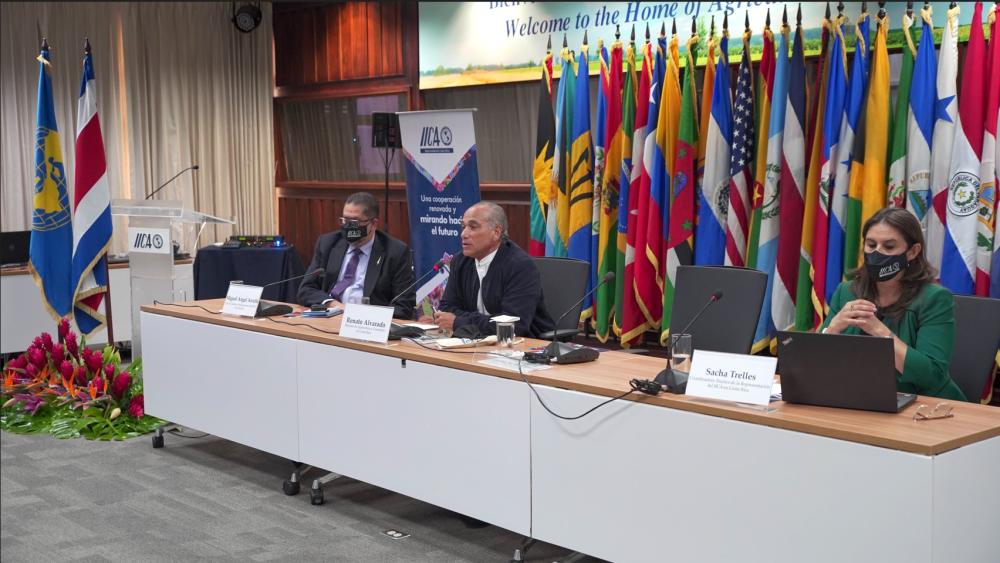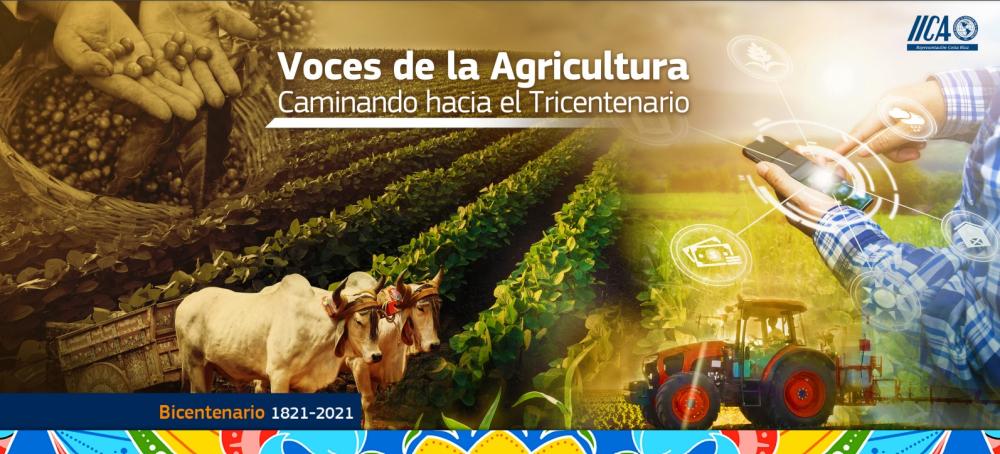Agriculture in Costa Rica gains strength and increases technology use in 2021 with IICA support

San Jose, 6 May 2022 (IICA) – In the period 2020-2021, the Inter-American Institute for Cooperation on Agriculture (IICA) trained 1,200 individuals involved in the agriculture sector and executed 16 projects financed with external resources and 82 technical cooperation actions in Costa Rica.
These actions represent an investment of close to USD 2.8 million in the country, which means that for each dollar contributed to IICA via the annual quota, Costa Rica received the equivalent of USD 33 in technical cooperation aimed at institutes, partners and farmers in a challenging context brought on by the pandemic and the complexity of international trade.
This data was included in the 2020-2021 accountability report made by the IICA Delegation in Costa Rica to the authorities of the Ministry of Agriculture and Livestock (MAG), sector institutions and representatives of farmer organizations and academia.
“Costa Rica is a benchmark; I’m convinced that from Central America, it projects beyond its borders to the entire continent and even worldwide; it is recognized for environmental issues, health matters, associative models, rural development and its solidarity economy”, expressed Manuel Otero, Director General of IICA.
“2021 was an important year as the country celebrated 200 years of independence in the midst of a complex, uncertain and ever-changing context, in which the value of the rural sector—which always was and still is up for the task—as the guarantor of food, nutrition and environmental security was demonstrated not only here but across other countries as well”, he added.
“I am grateful to IICA for our efforts in recent years and its work to promote projects in cacao, livestock, coffee, innovation and technology transfer”, expressed Renato Alvarado, Minister of Agriculture and Livestock.
The minister also highlighted the hands-on assistance given to cacao, which has a “great opportunity to reach the same levels as coffee in Costa Rica in terms of quality, aroma and taste”.
At the meeting, officials presented the high-impact contributions made to both the national and regional agriculture sector, including the two European Union-supported projects: Adapted Agroforestry Systems for the Central American Dry Corridor (AGRO-INNOVA), which seeks to improve resilience to climate variability; and PROCAGICA, which supported the consolidation of the ICAFE Molecular Biology Laboratory to strengthen the technical health capacity of Costa Rica’s coffee sector and the construction of the sector’s first ever gender policy.
They also highlighted other results such as strengthening sector-aimed financing programs with the Development Banking System; strengthening actions in animal and public health with the National Animal Health Service; promoting digitization and innovation through a course to generate maps and photogrammetric content for agricultural use; and preparing a proposal for regional agricultural insurance presented to the area’s Ministers of Agriculture through the Central American Agricultural Council, among other projects.
At the accountability meeting, Carlos Fonseca, Technical Manager of the Costa Rican Coffee Institute (ICAFE), expressed that “the molecular biology lab will enable us to identify pest- and disease-resistant genes to help identify plants while they’re still young and determine their barriers to resistance so as to scientifically attack the onslaught of coffee rust”.
Robin Almendares, Executive Director of the National Council of 4S Clubs, highlighted “the coordination and articulation of work through AGRO-INNOVA with young people in technical high schools in the country’s rural areas, based on a vision of innovative technological development and the possibility of contributing to generational change-over in the short and medium terms”.
Eric Montero, Executive Director of the National Chamber of Milk Producers, thanked “IICA for defending in global environmental forums the importance of the American agriculture sector, and for supporting the development of initiatives that benefit small- and medium-scale milk famers in the country and across Central America”.

Also presented at the event was the publication entitled “Voices of Agriculture – Toward the Tricentennial”, which aims to recognize the role of agriculture in the country’s development through a compilation of conversations with different stakeholders from the public, private, education and civic sectors reflecting on the past, present and future of agriculture in Costa Rica.
“The road to the tricentennial presents a series of challenges to the development of agriculture based on the country’s growth requirements, such as climate change mitigation and adaptation, the need to innovate and develop new technologies, improve the sector’s governance and strengthen agricultural trade networks and international cooperation chains”, said Miguel Arvelo, IICA Representative in Costa Rica.
Video: IICA actions in Costa Rica for the period 2020-2021
More information:
Institutional Communication Division
comunicacion.institucional@iica.int